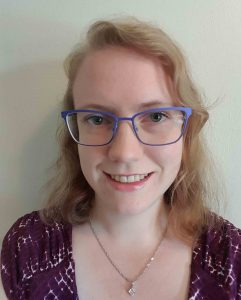Board Members
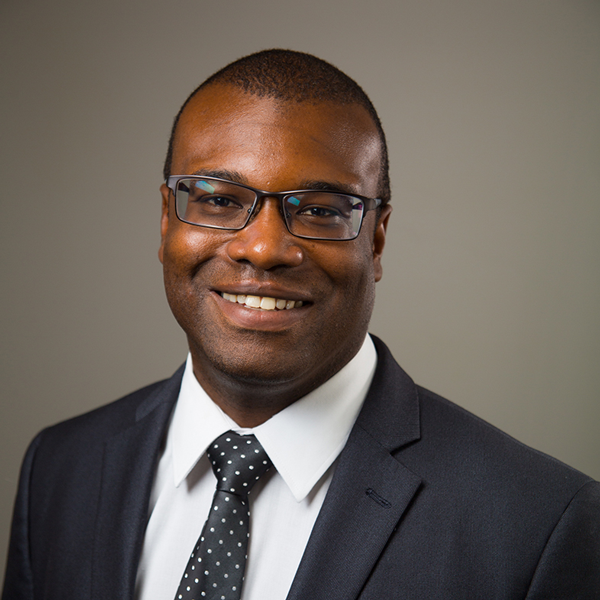 Antonio Byrd (he/they) is an assistant professor of English at the University of Missouri-Kansas City, where he teaches courses in Black literacies, professional and technical communication, multimodal writing and rhetorics, digital rhetoric, and composition. His research studies how the legacies of liberation carry forward into Black digital literacies, with a special focus on Black adults learning and using computer programming. His work has appeared in College Composition and Communication, Literacy in Composition Studies, Technical Communication Quarterly, and Writer: Craft and Context. He is the winner of the 2021 CCCCs Braddock Award. His current book project is tentatively titled The Literacy Pivot: How Black Adults Learn Computer Programming in a Racist World and is under contract with The WAC Clearinghouse/University of Colorado Press.
Antonio Byrd (he/they) is an assistant professor of English at the University of Missouri-Kansas City, where he teaches courses in Black literacies, professional and technical communication, multimodal writing and rhetorics, digital rhetoric, and composition. His research studies how the legacies of liberation carry forward into Black digital literacies, with a special focus on Black adults learning and using computer programming. His work has appeared in College Composition and Communication, Literacy in Composition Studies, Technical Communication Quarterly, and Writer: Craft and Context. He is the winner of the 2021 CCCCs Braddock Award. His current book project is tentatively titled The Literacy Pivot: How Black Adults Learn Computer Programming in a Racist World and is under contract with The WAC Clearinghouse/University of Colorado Press.
Douglas Eyman teaches courses in digital rhetoric, technical and scientific communication, and professional writing at George Mason University. His current research interests include investigations of digital literacy acquisition and development, new media scholarship, electronic publication, information design/information architecture, teaching in digital environments, and online games as sites for digital rhetoric research. Eyman is the senior editor and publisher of Kairos: A Journal of Rhetoric, Technology, and Pedagogy. Key publications include Digital Rhetoric: Theory, Method, Practice, and Play/Write (co-edited with Andréa Davis). His scholarly work has appeared in Pedagogy, Technical Communication, and Computers and Composition, as well as in a range of edited collections.
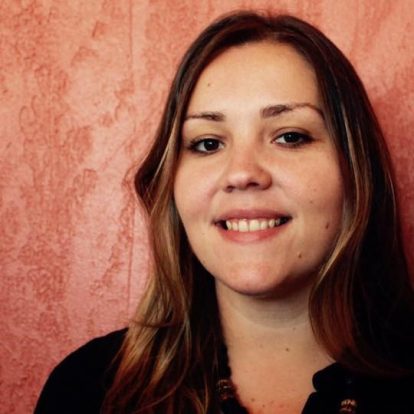 Laura Gonzales is an Associate Professor of Digital Writing and Cultural Rhetorics in the Department of English at the University of Florida. Her research focuses on the intersections of language diversity, community engagement, and technology design. Dr. Gonzales is the author of Sites of Translation: What Multilinguals Can Teach Us About Digital Writing and Rhetoric (University of Michigan Press, 2018), which won the 2020 CCCC Advancement of Knowledge Award and the 2016 Digital Rhetoric Collaborative Book Prize. Her second monograph, Designing Multilingual Experiences in Technical Communication, is forthcoming by Utah State University Press. Dr. Gonzales is the Vice President of the Association of Teachers of Technical Writing (ATTW), Diversity Committee Chair for the Council of Programs in Technical and Scientific Communication (CPTSC), and the editor of Reflections: A Journal of Community-Engaged Writing and Rhetoric. She was the 2020 winner of the 7C Committee Technology Innovator Award and a Sweetland DRC fellow from 2013-2014.
Laura Gonzales is an Associate Professor of Digital Writing and Cultural Rhetorics in the Department of English at the University of Florida. Her research focuses on the intersections of language diversity, community engagement, and technology design. Dr. Gonzales is the author of Sites of Translation: What Multilinguals Can Teach Us About Digital Writing and Rhetoric (University of Michigan Press, 2018), which won the 2020 CCCC Advancement of Knowledge Award and the 2016 Digital Rhetoric Collaborative Book Prize. Her second monograph, Designing Multilingual Experiences in Technical Communication, is forthcoming by Utah State University Press. Dr. Gonzales is the Vice President of the Association of Teachers of Technical Writing (ATTW), Diversity Committee Chair for the Council of Programs in Technical and Scientific Communication (CPTSC), and the editor of Reflections: A Journal of Community-Engaged Writing and Rhetoric. She was the 2020 winner of the 7C Committee Technology Innovator Award and a Sweetland DRC fellow from 2013-2014.
 Derek Mueller is Professor of Rhetoric and Writing, and Director of Composition at Virginia Tech. Generally, Mueller’s teaching and research inquire into the knot puzzle of writing, rhetorics, and technologies. More specifically, he works at the intersection of networked writing practices, research methods and methodologies, data visualization and imagetext rhetorics, theories and practices of composition, and accounts of disciplinary coalescence and maturation, particularly in the context of rhetoric and composition/writing studies. His 2018 book, Network Sense: Methods for Visualizing A Discipline, was awarded the Computers & Composition Distinguished Book Award (2018) and CCCC Research Impact Award (2019). Mueller’s current research considers disciplinary hauntology, taking up a series of gones, or marked termini and lossy conditions, tracing impermanence and its consequences for ever-dissipating knowledges. For more, visit http://www.derekmueller.net/.
Derek Mueller is Professor of Rhetoric and Writing, and Director of Composition at Virginia Tech. Generally, Mueller’s teaching and research inquire into the knot puzzle of writing, rhetorics, and technologies. More specifically, he works at the intersection of networked writing practices, research methods and methodologies, data visualization and imagetext rhetorics, theories and practices of composition, and accounts of disciplinary coalescence and maturation, particularly in the context of rhetoric and composition/writing studies. His 2018 book, Network Sense: Methods for Visualizing A Discipline, was awarded the Computers & Composition Distinguished Book Award (2018) and CCCC Research Impact Award (2019). Mueller’s current research considers disciplinary hauntology, taking up a series of gones, or marked termini and lossy conditions, tracing impermanence and its consequences for ever-dissipating knowledges. For more, visit http://www.derekmueller.net/.
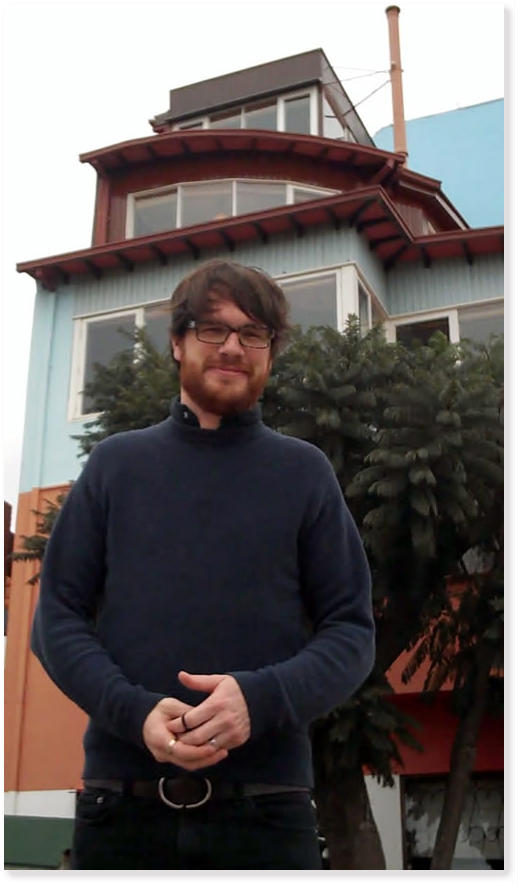 Jentery Sayers is an Associate Professor of English and Cultural, Social, and Political Thought at the University of Victoria, where he also directs the Praxis Studio for Comparative Media Studies with support from the Canada Foundation for Innovation. His work appears in The Journal of Electronic Publishing, American Literature, Visible Language, Literature Compass, Victorian Review, Amodern, Hyperrhiz: New Media Cultures, Keywords for American Cultural Studies, Computers and Composition Online, and Kairos: A Journal of Rhetoric, Technology, and Pedagogy. He’s the editor of Making Things and Drawing Boundaries (University Minnesota Press), the Routledge Companion to Media Studies and Digital Humanities (Routledge), and Digital Pedagogy in the Humanities (Modern Language Association, with Davis, Harris, and Gold, co-editors). He is a member of the editorial board for Kairos and the steering committee for the Humanities, Arts, Science, and Technology Advanced Collaboratory (HASTAC).
Jentery Sayers is an Associate Professor of English and Cultural, Social, and Political Thought at the University of Victoria, where he also directs the Praxis Studio for Comparative Media Studies with support from the Canada Foundation for Innovation. His work appears in The Journal of Electronic Publishing, American Literature, Visible Language, Literature Compass, Victorian Review, Amodern, Hyperrhiz: New Media Cultures, Keywords for American Cultural Studies, Computers and Composition Online, and Kairos: A Journal of Rhetoric, Technology, and Pedagogy. He’s the editor of Making Things and Drawing Boundaries (University Minnesota Press), the Routledge Companion to Media Studies and Digital Humanities (Routledge), and Digital Pedagogy in the Humanities (Modern Language Association, with Davis, Harris, and Gold, co-editors). He is a member of the editorial board for Kairos and the steering committee for the Humanities, Arts, Science, and Technology Advanced Collaboratory (HASTAC).
Directors
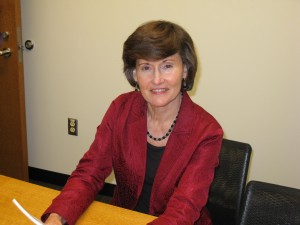 Anne Ruggles Gere is Arthur F. Thurnau Professor and Gertrude Buck Collegiate Professor at the University of Michigan, where she serves as Co-Chair of the Joint PhD in English and Education. A past chair of the Conference on College Composition and Communication and a past president of the National Council of Teachers of English, she is currently First Vice President of the Modern Language Association and will serve as President from January 2018 to January 2019. She has published a dozen books and over 100 articles on writing. An early adopter of computer-based writing, she ran a Beta site for WANDAH, a computer program that later became HBJ Writer. More recently she received a Computerworld Smithsonian Award for integrating technology into a teacher education program, and she led initiatives at UM to offer new media writing courses for undergraduates. Currently she is PI of “The Book Unbound: Enhancing Multilayered Digital Publications through Collaboration,” a project that will produce a layered digital narrative of a longitudinal study of student writing development and include complex multimedia objects.
Anne Ruggles Gere is Arthur F. Thurnau Professor and Gertrude Buck Collegiate Professor at the University of Michigan, where she serves as Co-Chair of the Joint PhD in English and Education. A past chair of the Conference on College Composition and Communication and a past president of the National Council of Teachers of English, she is currently First Vice President of the Modern Language Association and will serve as President from January 2018 to January 2019. She has published a dozen books and over 100 articles on writing. An early adopter of computer-based writing, she ran a Beta site for WANDAH, a computer program that later became HBJ Writer. More recently she received a Computerworld Smithsonian Award for integrating technology into a teacher education program, and she led initiatives at UM to offer new media writing courses for undergraduates. Currently she is PI of “The Book Unbound: Enhancing Multilayered Digital Publications through Collaboration,” a project that will produce a layered digital narrative of a longitudinal study of student writing development and include complex multimedia objects.
 Naomi Silver works in the Sweetland Center for Writing at the University of Michigan, where she teaches and does research on writing centers, writing in the disciplines, and digital rhetoric. Her current research projects include studies of the impact of electronic portfolios and digitally mediated reflective practice on college student writing development, in connection with the International Coalition for Electronic Portfolio Research; and the role of metacognition in student acquisition of disciplinary writing conventions in upper-level writing classes, in collaboration with a cohort of 13 research universities sponsored by the Teagle and Spencer Foundations. Recent publications include a co-edited collection on Reflection and Metacognition in College Teaching, forthcoming from Stylus Press, and a co-authored article on “The Idea of a Multiliteracy Center: Six Responses” in the Spring 2012 issue of Praxis.
Naomi Silver works in the Sweetland Center for Writing at the University of Michigan, where she teaches and does research on writing centers, writing in the disciplines, and digital rhetoric. Her current research projects include studies of the impact of electronic portfolios and digitally mediated reflective practice on college student writing development, in connection with the International Coalition for Electronic Portfolio Research; and the role of metacognition in student acquisition of disciplinary writing conventions in upper-level writing classes, in collaboration with a cohort of 13 research universities sponsored by the Teagle and Spencer Foundations. Recent publications include a co-edited collection on Reflection and Metacognition in College Teaching, forthcoming from Stylus Press, and a co-authored article on “The Idea of a Multiliteracy Center: Six Responses” in the Spring 2012 issue of Praxis.
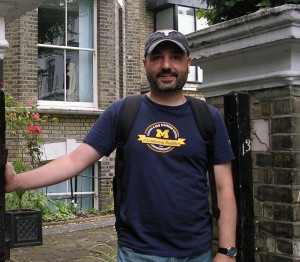 Simone Sessolo is Interim Associate Director of the Sweetland Center for Writing at the University of Michigan and works in the Sweetland Center for Writing and the Digital Studies Institute at the University of Michigan, Ann Arbor. At Sweetland, he co-directs the Dissertation Writing Institute and the Dissertation Writing Groups, and he chairs the Digital and Social Media Curriculum Committee. In May 2020, he received the inaugural Digital Studies Institute Teaching Award. He teaches classes that emphasize bridging the gap between academic and social purposes, particularly appreciating the way digital rhetoric facilitates the development of multimodal literacy. Recently, he headed the development of the Dissertation eCoach, an interactive digital messaging tool that assists graduate students transitioning from coursework to dissertation writing. For that project, his team received the Academic Innovation Fund (twice), the Rackham Dean’s Strategic Initiatives Fund, the CRLT Instructional Development Fund, and the Vice Provost for Global Engagement and Interdisciplinary Academic Affairs Funding for Research on Teaching and Learning. His work has appeared in The Journal of Popular Culture, Syllabus, Prompt, and The JUMP+. You can follow him on Twitter @Simone_Sessolo, and on Instagram as simonesessolo.
Simone Sessolo is Interim Associate Director of the Sweetland Center for Writing at the University of Michigan and works in the Sweetland Center for Writing and the Digital Studies Institute at the University of Michigan, Ann Arbor. At Sweetland, he co-directs the Dissertation Writing Institute and the Dissertation Writing Groups, and he chairs the Digital and Social Media Curriculum Committee. In May 2020, he received the inaugural Digital Studies Institute Teaching Award. He teaches classes that emphasize bridging the gap between academic and social purposes, particularly appreciating the way digital rhetoric facilitates the development of multimodal literacy. Recently, he headed the development of the Dissertation eCoach, an interactive digital messaging tool that assists graduate students transitioning from coursework to dissertation writing. For that project, his team received the Academic Innovation Fund (twice), the Rackham Dean’s Strategic Initiatives Fund, the CRLT Instructional Development Fund, and the Vice Provost for Global Engagement and Interdisciplinary Academic Affairs Funding for Research on Teaching and Learning. His work has appeared in The Journal of Popular Culture, Syllabus, Prompt, and The JUMP+. You can follow him on Twitter @Simone_Sessolo, and on Instagram as simonesessolo.
Graduate Administrative and Editorial Associate
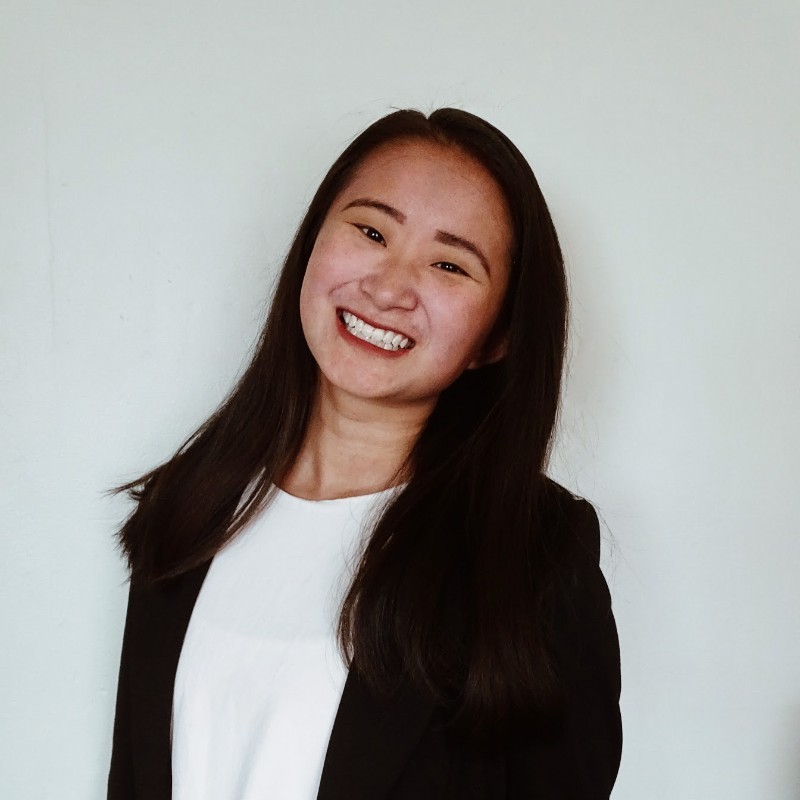 Alyse Campbell is a PhD student in the Joint Program for English and Education at the University of Michigan. She is also a Graduate Student Instructor in the University of Michigan’s English Department Writing Program and steering committee member for Language and Rhetorical Studies (LangRhet). She received her B.A. in English and Communication from The University of Washington and her M.A. in Teaching from Relay Graduate School of Education. As a former high school ELA instructor, she is particularly interested in analyzing digital tools that are used in secondary English classrooms. Her research interests include: digital writing, composition pedagogy, and Asian American rhetoric and literature. You can find Alyse online at alysemeilan.com.
Alyse Campbell is a PhD student in the Joint Program for English and Education at the University of Michigan. She is also a Graduate Student Instructor in the University of Michigan’s English Department Writing Program and steering committee member for Language and Rhetorical Studies (LangRhet). She received her B.A. in English and Communication from The University of Washington and her M.A. in Teaching from Relay Graduate School of Education. As a former high school ELA instructor, she is particularly interested in analyzing digital tools that are used in secondary English classrooms. Her research interests include: digital writing, composition pedagogy, and Asian American rhetoric and literature. You can find Alyse online at alysemeilan.com.
Former Graduate Associates
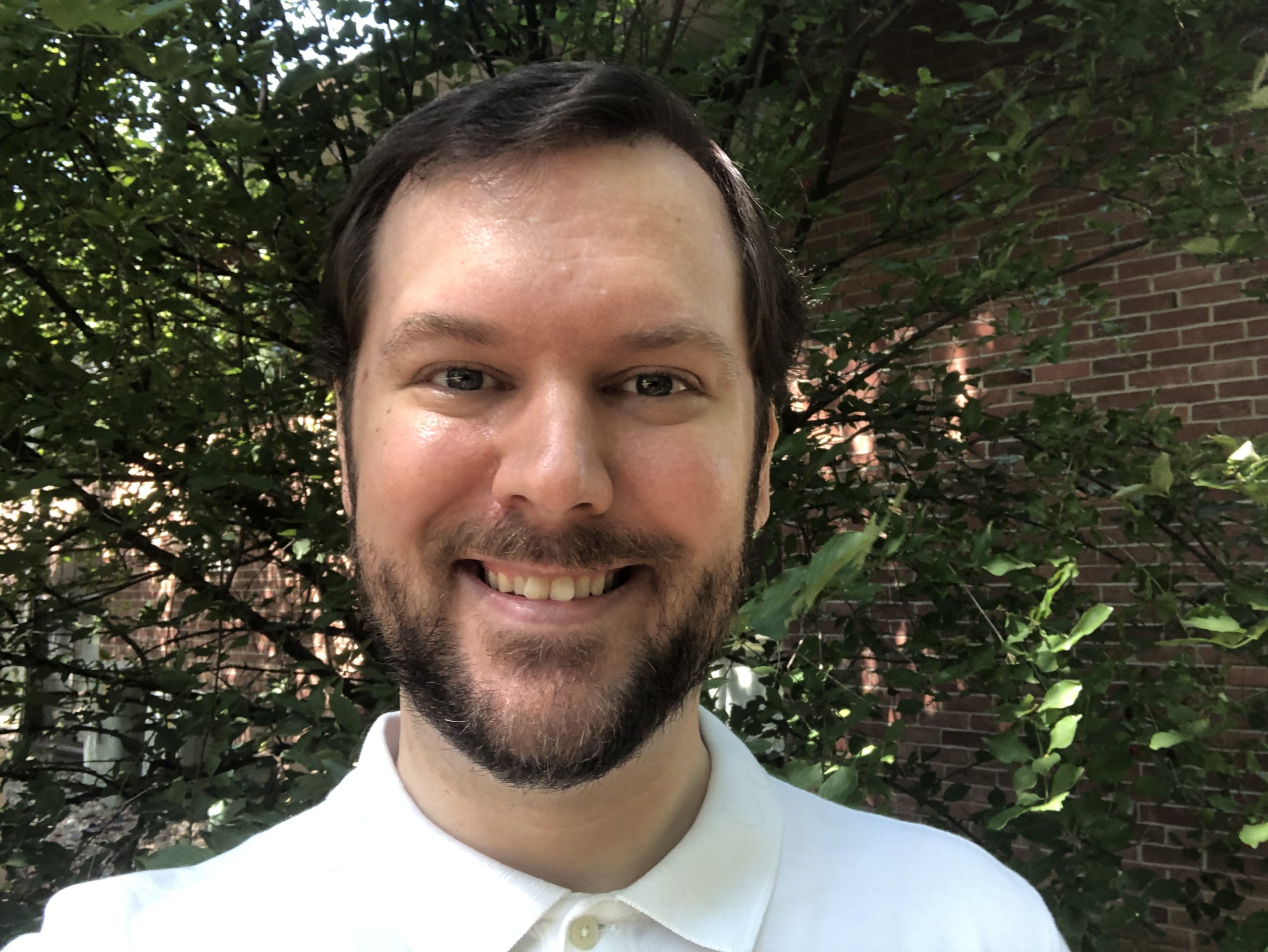 Jathan Day is a PhD candidate in the University of Michigan’s Joint Program in English and Education. He is a graduate teaching assistant in the English Department Writing Program and a graduate consultant for the Center for Research on Learning and Teaching (CRLT). He received a B.A. in English and Languages and an M.A. in English at the University of Alaska Anchorage. Jathan’s research interests include learning management systems, digital literacies and rhetorics, online pedagogy, online accessibility, and collaboration. His dissertation examines how writing instructors’ pedagogies and design decisions in Canvas affect the way in which students engage with it through their writing and learning. You can find Jathan online at jathanday.wordpress.com.
Jathan Day is a PhD candidate in the University of Michigan’s Joint Program in English and Education. He is a graduate teaching assistant in the English Department Writing Program and a graduate consultant for the Center for Research on Learning and Teaching (CRLT). He received a B.A. in English and Languages and an M.A. in English at the University of Alaska Anchorage. Jathan’s research interests include learning management systems, digital literacies and rhetorics, online pedagogy, online accessibility, and collaboration. His dissertation examines how writing instructors’ pedagogies and design decisions in Canvas affect the way in which students engage with it through their writing and learning. You can find Jathan online at jathanday.wordpress.com.
Adrienne Raw is an Assistant Professor of Professional Writing at SUNY Cortland where she teaches classes in professional, technical, and public writing; rhetoric; and digital culture and composition. She served as the DRC’s Graduate Associate from 2016 to 2019 while completing her PhD in The University of Michigan’s Joint Program in English and Education. Her research focuses on discussion and discourse in fandom communities. Her other research interests include composition pedagogy, multimedia writing and teaching, and professional communication. She earned her BA in Anthropology and Rhetoric and Professional Writing and her MA in Rhetoric and Communication Design from the University of Waterloo, and her B.Ed in Adult Education from Brock University. She is currently working on an academic manuscript about the role and perceptions of discussion/discourse within fandom communities on Tumblr. You can follow her on Twitter @AdrienneRaw.
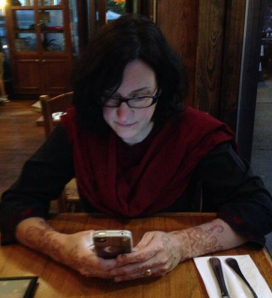 Merideth Garcia is a PhD student in The University of Michigan’s Joint Program in English and Education. She is a Rackham Merit Fellow and a Graduate Student Instructor of composition and English teaching methods. Her research interests include multimedia composition across the curriculum, digital writing pedagogy and practice, and teacher education. She earned her BA in English Literature and her M.Ed in Curriculum and Instruction from The University of Texas at Austin and her MA in English Literature from The Bread Loaf School of English at Middlebury College. She taught English and English to Speakers of Other Languages for ten years at the middle school, high school, and community college levels. You can follow her on twitter @mgarcia or find her online at http://meridethgarcia.com
Merideth Garcia is a PhD student in The University of Michigan’s Joint Program in English and Education. She is a Rackham Merit Fellow and a Graduate Student Instructor of composition and English teaching methods. Her research interests include multimedia composition across the curriculum, digital writing pedagogy and practice, and teacher education. She earned her BA in English Literature and her M.Ed in Curriculum and Instruction from The University of Texas at Austin and her MA in English Literature from The Bread Loaf School of English at Middlebury College. She taught English and English to Speakers of Other Languages for ten years at the middle school, high school, and community college levels. You can follow her on twitter @mgarcia or find her online at http://meridethgarcia.com


